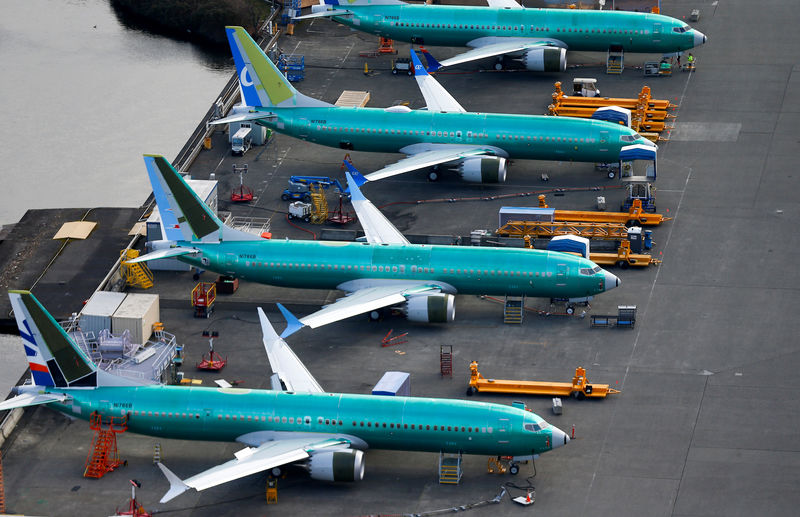By David Shepardson
WASHINGTON (Reuters) - The U.S. Federal Aviation Administration on Sunday disclosed a new problem involving Boeing (NYSE:BA) Co's grounded 737 MAX, saying that more than 300 of that troubled plane and the prior generation 737 may contain improperly manufactured parts and that the agency will require these parts to be quickly replaced.
The FAA said up to 148 of the part known as a leading-edge slat track that were manufactured by a Boeing supplier are affected, covering 179 MAX and 133 NG aircraft worldwide. Slats are movable panels that extend along the wing's front during takeoffs and landings to provide additional lift. The tracks guide the slats and are built into the wing.
The 737 MAX, Chicago-based Boeing's best-selling jet, was grounded globally in March following a fatal Ethiopian Airlines crash after a similar Lion Air disaster in Indonesia in October. The two crashes together killed 346 people. Boeing has yet to submit a software upgrade to the FAA as it works to get approval to end the grounding of the 737 MAX.
In a statement issued after the FAA announcement, Boeing said it has not been informed of any in-service issues related to this batch of slat tracks. Boeing, the world's largest plane maker, said it has identified 20 737 MAX airplanes most likely to have the faulty parts and that airlines will check an additional 159 MAXs for these parts.
Boeing said it has identified 21 737 NGs most likely to have the suspect parts and is advising airlines to check an additional 112 NGs. The NG is the third-generation 737 that the company began building in 1997.
The affected parts "may be susceptible to premature failure or cracks resulting from the improper manufacturing process," the FAA said.
The FAA said a complete failure of a leading edge slat track would not result in the loss of the aircraft, but a failed part could cause aircraft damage in flight.
The FAA said it will issue an Airworthiness Directive to require Boeing's service actions to identify and remove the parts from service. It said operators will be required to perform this action within 10 days, but can continue to fly the planes during the 10-day period before the parts are removed.
FINANCIAL IMPACT ON BOEING
Boeing in April said the two fatal crashes had cost it at least $1 billion as it abandoned its 2019 financial outlook, halted share buybacks and lowered production. The company's shares have fallen by nearly 20 percent since the Ethiopian Airlines crash in March.
Some international carriers are skeptical the plane will resume flying by August as some U.S. airlines have suggested.
Tim Clark, president of Emirates, told reporters in Seoul that it could take six months to restore operations as other regulators re-examine the U.S. delegation practices. "If it is in the air by Christmas (Dec. 25) I'll be surprised - my own view," he said.
Boeing said one batch of slat tracks with specific lot numbers produced by a supplier was found to have a "potential nonconformance" and said airlines "are to replace them with new ones before returning the airplane to service."
The company said it is "now staging replacement parts at customer bases to help minimize aircraft downtime while the work is completed." Boeing said once new parts are in hand, replacement work should take one to two days.
A separate service bulletin will go to 737 MAX operators to do inspections before the MAX fleet returns to service.
The FAA said Boeing has identified groups of both 737 NG and 737 MAX airplane serial numbers on which these suspect parts may have been installed, including 32 NG and 33 MAX in the United States.
The issue was discovered following an investigation conducted by Boeing and the FAA Certificate Management Office, the FAA said. An FAA spokesman said the issue should not delay Boeing's planned submission of a software update and training revisions, but it remains unclear when that will be submitted.
The FAA has said it has no timetable for ending the grounding of the airplane. Boeing said last month it completed its software upgrade but was still working to address information requests from the FAA before it can schedule a certification test flight and submit final certification documentation.
Reuters reported last month that the FAA has indicated privately to other regulators that it aims to certify new software by the end of June, after which it would take several weeks at a minimum to get planes flying.
Acting FAA Administrator Dan Elwell told reporters on May 23 in Texas after a meeting with more than 30 international air regulators that the agency had not decided yet on training requirements.
